Ghana is a vibrant, culturally rich country with stunning beaches, lively cities, and warm hospitality.
While it can be an affordable destination compared to Western countries, costs can add up if you’re not careful. But don’t worry—with the right tips, you can explore Ghana without breaking the bank.
Whether you’re a backpacker or a budget-conscious traveler, this guide will help you stretch your cedis while experiencing the best of Ghana.
Budget-Friendly Ways to Get to Ghana
Finding Cheap Flights
- Use flight comparison tools like Skyscanner and Google Flights to track airfare trends.
- Book in advance (3-6 months ahead) for the best deals.
- Be flexible with your travel dates; flights are often cheaper on weekdays.
- Consider layovers instead of direct flights to save money.
Visa on a Budget
- Apply for a Ghanaian visa ahead of time at your local embassy to avoid last-minute express fees.
- Check for any visa-free agreements if you’re from an ECOWAS country.
Affordable Accommodation Options
Budget Hostels & Guesthouses
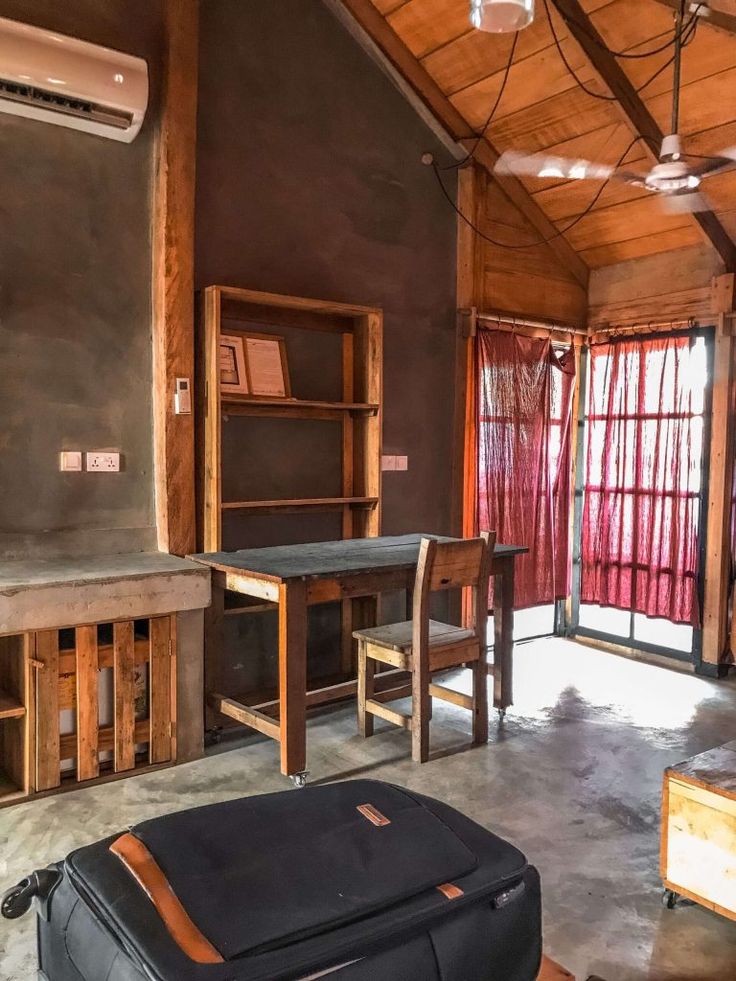
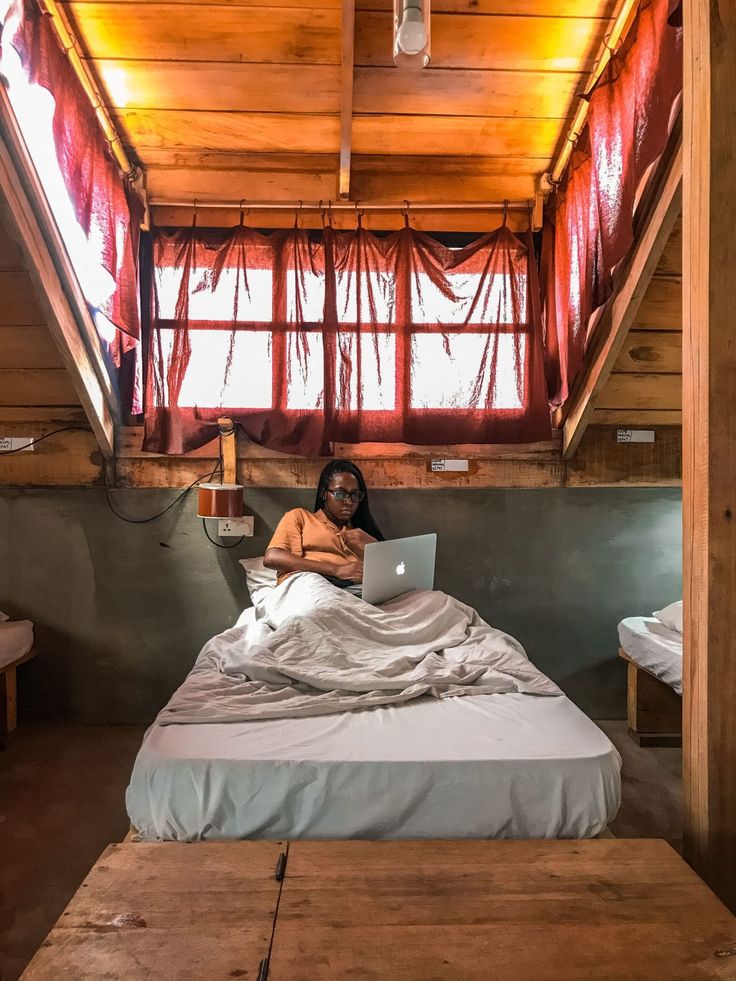
- Some of the best budget stays include:
- Somewhere Nice (Accra) – A backpacker-friendly hostel with free breakfast and a pool.
- Rising Phoenix (Accra) – A simple, beachside guesthouse with affordable dorm rooms.
- Oasis Beach Resort (Cape Coast) – A budget-friendly stay near the ocean.
- Green House (Accra) – A cozy and affordable guesthouse with great reviews from budget travelers.
- Meet Me There Lodge (Volta Region) – A beautiful eco-lodge with budget-friendly accommodation right by the water.
- Big Milly’s Backyard (Kokrobite) – A legendary spot for backpackers, offering affordable stays right on the beach.
- Sanaa Lodge (Kumasi) – A budget-friendly lodge that provides a comfortable stay close to the city center.
These are just a few ones.
Couchsurfing & Homestays
- Ghana has a small but growing Couchsurfing community where locals host travelers for free.
- Consider homestays for an affordable and immersive cultural experience.
Getting Around Ghana on a Budget

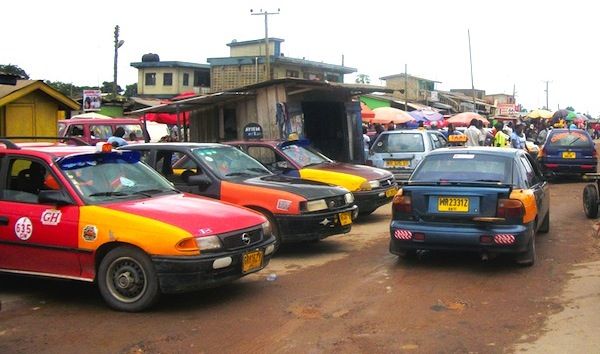
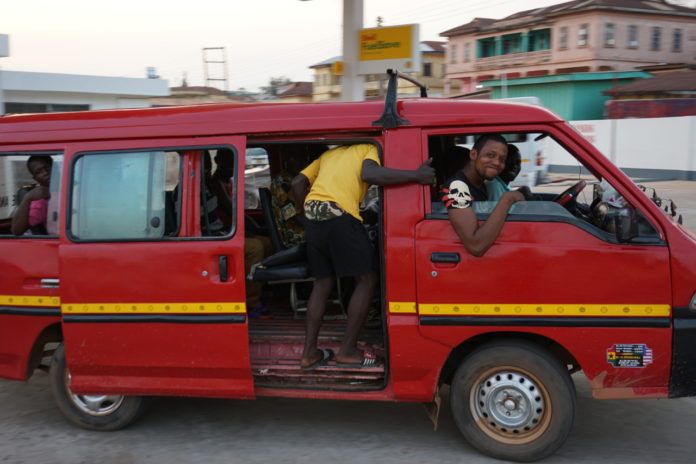
Public Transport: Trotros & Shared Taxis
- Trotros (shared minibuses) are the cheapest way to travel between towns and cities.
- Shared taxis are slightly more expensive but faster and still affordable.
- Use STC or VIP buses for long-distance travel instead of pricey private hires.
Hitchhiking & Carpooling
- Ghanaian culture is friendly, and hitchhiking (known as “lifting”) is common.
- Apps like Uber and Bolt offer cheaper ride-hailing options compared to traditional taxis.
Eating Well Without Overspending
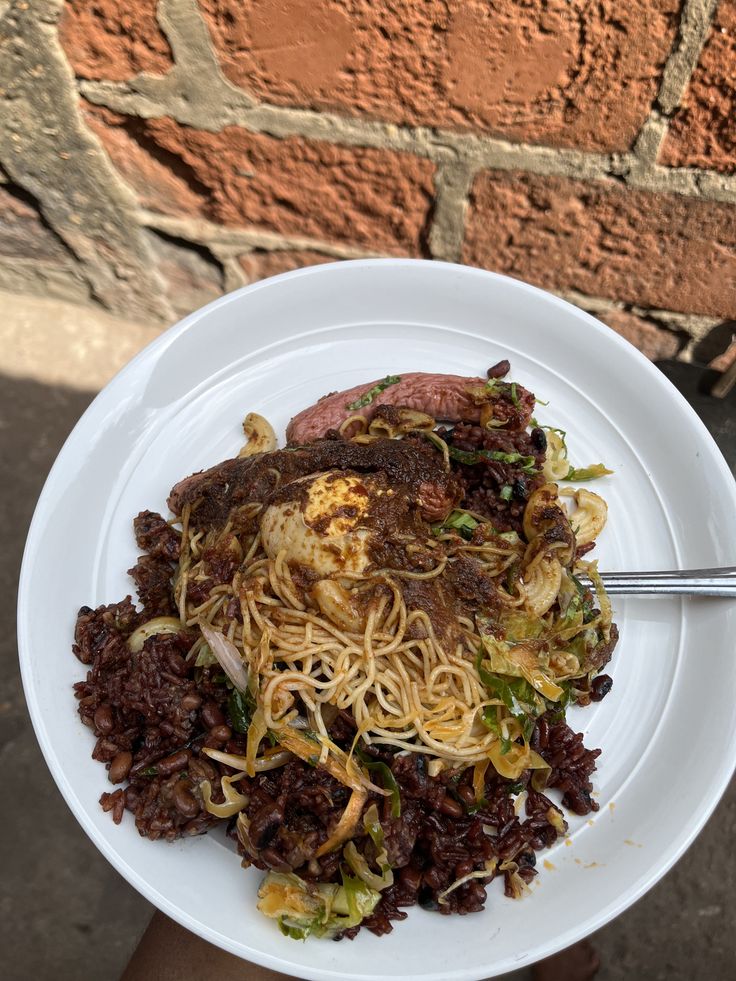

Street Food & Local Eateries
- Eat at “chop bars” (local food joints) for tasty and cheap meals.
- Some must-try budget-friendly meals:
- Waakye (rice and beans) – $1-$2
- Jollof rice with chicken – $2-$3
- Fufu with soup – $2-$4
Self-Catering & Markets
- Buy fresh produce at markets like Makola Market (Accra) and Kejetia Market (Kumasi).
- Many hostels have kitchens where you can cook your own meals.
Exploring Ghana on a Budget
Ghana is packed with incredible places to visit, and the best part? You don’t need to spend a fortune to experience them. From golden beaches to vibrant markets and historical sites, here’s how to explore Ghana affordably.
Free & Cheap Attractions
Beaches – Sun, Sand, and Relaxation
Ghana’s coastline stretches over 500 km, offering plenty of stunning beaches. While some charge a small entrance fee, many are completely free.
- Kokrobite Beach (Free) – A lively beach near Accra with reggae vibes, bonfires, and affordable guesthouses.
- Labadi Beach (Small fee) – One of Accra’s most popular beaches. If you stay at a beachfront hotel, entry is usually free.
- Busua Beach (Free) – A serene paradise in the Western Region, perfect for budget surfers and nature lovers.
- Axim Beach (Free) – Less touristy but breathtaking, great for travelers looking for a quiet escape.
Markets – A Cultural Experience
Markets in Ghana are more than just places to shop—they’re vibrant, chaotic, and full of life. Even if you’re not buying much, visiting these spots is an adventure in itself.
- Makola Market (Accra) – A massive open-air market where you can find everything from fabric to food.
- Kejetia Market (Kumasi) – One of West Africa’s largest markets, a maze of traders selling everything imaginable.
- Cape Coast Arts Center – A great place for handmade souvenirs, including Kente cloth and wooden carvings.
Historical & Cultural Sites – Discover Ghana’s Heritage
Many of Ghana’s historical sites have entrance fees under $5, making them affordable even for budget travelers.
- Cape Coast Castle & Elmina Castle ($3-$5) – These UNESCO-listed forts tell the powerful story of Ghana’s past.
- Kwame Nkrumah Mausoleum ($2-$3) – A monument dedicated to Ghana’s first president, set in a peaceful park.
- W.E.B. Du Bois Center ($2) – A museum and final resting place of the famous African-American scholar.
- Larabanga Mosque (Donation-based) – Ghana’s oldest mosque, a stunning piece of ancient Sudanese architecture.
Affordable Nature & Adventure Activities
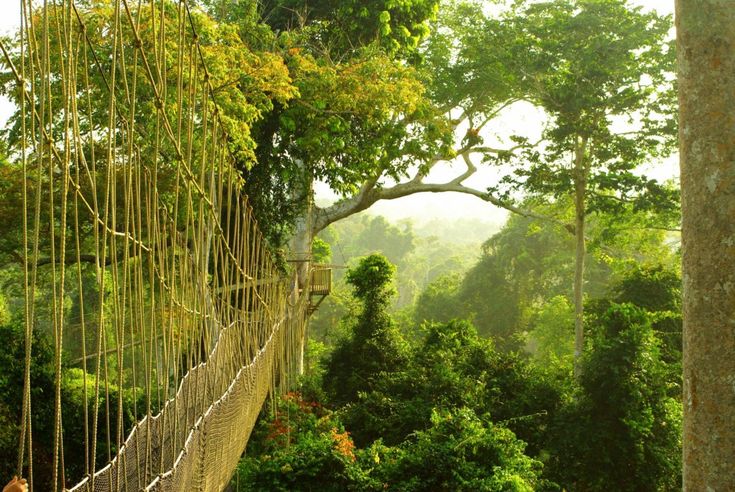

You don’t need an expensive tour package to explore Ghana’s incredible landscapes. These activities let you experience nature without emptying your wallet:
- Kakum National Park ($10) – Walk across the famous canopy walkway 40 meters above the rainforest.
- Wli Waterfalls (Small fee) – The highest waterfall in Ghana, located in the Volta Region, with a stunning hike leading up to it.
- Shai Hills Resource Reserve ($3-$5) – A hidden gem just outside Accra with hiking trails, caves, and baboons.
- Lake Bosomtwe (Free) – Ghana’s only natural lake, great for swimming, canoeing, or just relaxing by the shore.
- Tafi Atome Monkey Sanctuary ($3-$5) – Get up close with friendly mona monkeys in a protected forest.
Affordable Tours & Alternative Ways to Explore
- Hire local guides – Instead of expensive tour companies, look for community guides at destinations like Cape Coast Castle or Kakum National Park. They offer great insights at a fraction of the cost.
- Join group tours – If you must book a tour, joining a group can significantly reduce costs compared to solo packages.
- Use public transport – Instead of pricey private vehicles, take trotros (shared minibuses) to places like Cape Coast, Mole National Park, and the Volta Region.
Money-Saving Tips for Backpackers
Traveling on a budget doesn’t mean missing out on the best experiences—just that you have to be smart about your spending. Ghana is an incredible destination for budget travelers, and with the right tricks, you can stretch your cedis while making unforgettable memories.
1. Get a Local SIM Card & Use Affordable Internet
International roaming is expensive. The moment you land in Ghana, grab a local SIM card from MTN, Vodafone, or AirtelTigo. You’ll find SIM cards at the airport, roadside kiosks, and official shops.
- Data plans are cheap – You can get 10GB of data for around $10, which will last you a week or more if you use Wi-Fi where available.
- Use WhatsApp, Telegram, or Messenger to make calls instead of using regular phone minutes.
2. Travel Like a Local: Use Trotros & Shared Taxis
Trotros (those colorful, sometimes rickety minibuses) are the heartbeat of Ghanaian public transport. They may not be the most comfortable, but they are dirt cheap.
- Accra to Cape Coast by Trotro? Around $5 instead of a private taxi for $60+.
- Short city rides? Less than $1 compared to ride-hailing apps like Bolt and Uber, which charge $5-$10.
- Shared taxis are another budget-friendly option—cheaper than private taxis but faster than trotros.
3. Haggle Like a Pro (Negotiation is Key!)
Ghana has a vibrant bargaining culture, and as a traveler, you’re expected to negotiate in markets, taxis, and even some accommodations.
- Street vendors & local markets – Always ask for a lower price because the first price is usually inflated for tourists.
- Taxis & informal transport – Before getting into a taxi, ask locals how much the ride should cost so you don’t overpay.
- Souvenirs & handicrafts – When shopping at markets like the Accra Arts Centre, start by offering half of the quoted price, then meet somewhere in the middle.
4. Travel in Off-Peak Seasons for Cheaper Everything
If you visit Ghana between April-June and September-November, you’ll find:
- Cheaper flights – Airlines drop prices when fewer people are traveling.
- Discounted hotels & hostels – Many places lower their rates outside the December holidays and festival seasons.
- Fewer crowds at tourist sites – You’ll have Ghana’s best attractions almost to yourself.
5. Eat Local & Skip Western Restaurants
Eating at Western-style restaurants can blow your budget fast. Instead, embrace Ghanaian cuisine at chop bars (local eateries), street food joints, and market stalls.
- Street food: Delicious and filling meals like waakye (rice and beans), jollof rice, or kelewele (spicy fried plantains) cost as little as $1-$3.
- Chop bars: A plate of fufu with soup, banku with tilapia, or red red (beans and fried plantains) will cost $2-$4.
- Cook your own food: If you’re staying in a hostel with a kitchen, buy fresh ingredients from markets like Makola (Accra) or Kejetia (Kumasi) and prepare your own meals.
6. Stay in Budget Hostels, Guesthouses & Try Couchsurfing
Hotels in Ghana can be pricey, but there are plenty of budget-friendly stays:
- Hostels & guesthouses – Dorm beds in Accra can be found for as low as $10-$15 per night. Popular ones include:
- Somewhere Nice (Accra) – $15/night
- Oasis Beach Resort (Cape Coast) – $10-$12/night
- Meet Me There Lodge (Volta Region) – $15/night
- Big Milly’s Backyard (Kokrobite) – $10-$15/night
- Couchsurfing – Ghana has a small but growing Couchsurfing community where locals offer free accommodation to travelers.
7. Work or Volunteer in Exchange for Free Stay & Meals
Want to stay longer in Ghana without spending much? Consider work exchanges and volunteer programs where you help out in exchange for free accommodation and meals.
- Eco-lodges, farms, and hostels often take volunteers. Check platforms like Workaway, Worldpackers, or WWOOF for opportunities.
- Teaching English or volunteering at NGOs can also provide free housing and meals.
8. Avoid ATM Fees & Get the Best Exchange Rate
Withdrawing money frequently from ATMs can rack up fees. Here’s how to save money on cash withdrawals:
- Withdraw large amounts at once to avoid multiple transaction fees.
- Use banks like Ecobank or Stanbic with lower international withdrawal fees.
- Exchange USD or Euros at Forex Bureaus for better rates than the airport or hotels.
9. Skip Expensive Tour Packages – Hire Local Guides Instead
Some companies charge hundreds of dollars for day trips, but you don’t need them!
- Many attractions (like Cape Coast Castle, Kakum National Park, and Wli Waterfalls) have affordable on-site guides for just $5-$10.
- Ask locals for directions & recommendations – Ghanaians are extremely friendly and will often help you for free.
10. Stick to Free & Cheap Activities
Ghana has plenty of budget-friendly things to do:
- Explore free beaches like Kokrobite and Busua.
- Hike in nature reserves like Shai Hills ($3) or Aburi Botanical Gardens ($1-$2).
- Visit local markets for a cultural experience without spending anything.
- Join street festivals – Many of Ghana’s cultural celebrations are free to attend!

